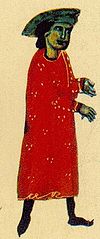
Raimbaut of Orange
Encyclopedia

Aumelas
Aumelas is a commune in the Hérault department in southern France.-Population:-References:*...
. His properties included the towns of Frontignan
Frontignan
Frontignan la Peyrade is a commune in the Hérault department in southern France.Frontignan is renowned for its AOC wine, the Muscat de Frontignan, a sweet wine made solely from the Muscat grape variety.-Sights:...
and Mireval
Mireval
Mireval is a commune in the Hérault department in Languedoc-Roussillon in southern France.It is famous for its muscat wine, the , from which François Rabelais wrote about in the beginning of the 16th century.-See also:*Communes of the Hérault department...
. He was the only son of William of Aumelas
William of Aumelas
William of Aumelas was the second son of William V of Montpellier and of Ermessende, daughter of count Peter of Melgueil. The lordship of Aumelas was detached from the territories of Montpellier to create a property for him....
and of Tiburge, daughter of Raimbaut, count of Orange
Raimbaut, Count of Orange
Raimbaut II, Count of Orange was the elder son of Bertrand Raimbaut and of his first wife Gilberte.Raimbaut's date of birth is not known...
. After the early death of Raimbaut's father, his guardians were his uncle William VII of Montpellier
William VII of Montpellier
William VII of Montpellier was the eldest son of William VI and of his wife Sibylle.Aged around 15, he inherited the lordship of Montpellier from his father in 1146 under the tutelage of his grandmother, Ermessende of Melgueil...
and his elder sister Tibors.
He was a major troubadour
Troubadour
A troubadour was a composer and performer of Old Occitan lyric poetry during the High Middle Ages . Since the word "troubadour" is etymologically masculine, a female troubadour is usually called a trobairitz....
, having contributed to the creation of trobar clus, or cryptic style, in troubadour poetry. About forty of his works survive, displaying a gusto for rare rhymes and intricate poetic form.
His death in 1173 is mourned in a planh (lament) by Giraut de Bornelh
Giraut de Bornelh
Giraut de Bornelh , whose first name is also spelled Guiraut and whose nickname was Borneil or Borneyll, was a troubadour, born to a lower class family in the Limousin, probably in Bourney, near Excideuil...
, and also in the only surviving poem of the trobairitz
Trobairitz
The trobairitz were Occitan female troubadours of the 12th and 13th centuries, active from around 1170 to approximately 1260. The word trobairitz was first used in the 13th-century romance Flamenca. It comes from the Provençal word trobar, the literal meaning of which is "to find", and the...
Azalais de Porcairagues
Azalais de Porcairagues
Azalais de Porcairagues or Alasais de Porcaragues was a trobairitz , composing in Occitan in the late 12th century....
, who was the lover of Raimbaut's cousin Gui Guerrejat
Gui Guerrejat
Gui Guerrejat was the fifth son of William VI of Montpellier. When still a boy, in 1146, he inherited the castles of Paulhan and le Pouget from his father....
. It seems possible that Azalais's poem was composed in an earlier form while Raimbaut was still alive, because in his poem A mon vers dirai chanso he appears to contribute to the poetical debate begun by Guilhem de Saint-Leidier
Guilhem de Saint-Leidier
Guilhem de Saint-Leidier or Guillem de Saint Deidier was a troubadour of the 12th century, composing in Occitan. He was lord of Saint Didier-en-Velay, was born at some date before 1150, and died between 1195 and 1200...
and taken up by Azalais as to whether a lady is dishonoured by taking a lover who is richer than herself (later there is a partimen
Jeu parti
Jeu parti [Fr.; Occitan joc partit, “partimen”]. A debate or dialogue in the form of a poem. According to Guilhem Molinier, the author of Las leys d'amors, a 13th-century treatise on how to write poetry in the style of the troubadours, there is a clear difference between a partimen and a tenso: in...
on the topic between Dalfi d'Alvernha and Perdigon
Perdigon
Perdigon or Perdigo was a troubadour from Lespéron in the Gabales, diocese of Gévaudan, modern Lozère. Fourteen of his works survive, including three cansos with melodies...
, and then a tensó
Tenso
A tenso is a style of Occitan song favoured by the troubadours. It takes the form of a debate in which each voice defends a position on a topic relating to love or ethics. Closely related genres include the partimen and the cobla exchange...
between Giraut de Bornelh and king Alfonso II of Aragon
Alfonso II of Aragon
Alfonso II or Alfons I ; Huesca, 1-25 March 1157 – 25 April 1196), called the Chaste or the Troubadour, was the King of Aragon and Count of Barcelona from 1164 until his death. He was the son of Ramon Berenguer IV of Barcelona and Petronilla of Aragon and the first King of Aragon who was...
). Aimo Sakari argues that Azalais is the mysterious joglar ("jongleur") addressed in several poems by Raimbaut.

